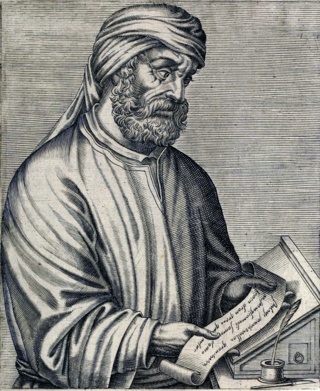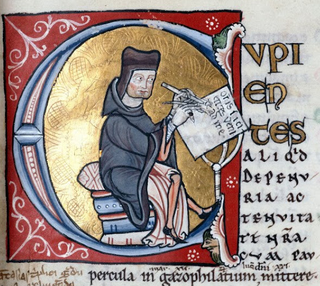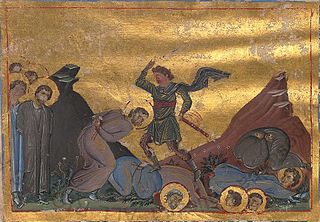Related Research Articles

Tertullian was a prolific early Christian author from Carthage in the Roman province of Africa. He was the first Christian author to produce an extensive corpus of Latin Christian literature and was an early Christian apologist and a polemicist against heresy, including contemporary Christian Gnosticism.

Philip Schaff was a Swiss-born, German-educated Protestant theologian and ecclesiastical historian, who spent most of his adult life living and teaching in the United States.
Walter of Châtillon was a 12th-century French writer and theologian who wrote in the Latin language. He studied under Stephen of Beauvais and at the University of Paris. It was probably during his student years that he wrote a number of Latin poems in the Goliardic manner that found their way into the Carmina Burana collection. During his lifetime, however, he was more esteemed for a long Latin epic on the life of Alexander the Great, the Alexandreis, sive Gesta Alexandri Magni, a hexameter epic, full of anachronisms; he depicts the Crucifixion of Jesus as having already taken place during the days of Alexander the Great. The Alexandreis was popular and influential in Walter's own times. Matthew of Vendôme and Alan of Lille borrowed from it and Henry of Settimello imitated it, but it is now seldom read. One line, referring to Virgil's Aeneid, is sometimes quoted:

Peter Lombard was an Italian scholastic theologian, Bishop of Paris, and author of Four Books of Sentences which became the standard textbook of theology, for which he earned the accolade Magister Sententiarum.
Gennadius of Massilia, also known as Gennadius Scholasticus or Gennadius Massiliensis, was a 5th-century Christian priest, monk, and historian.

Saint Pamphilus, was a presbyter of Caesarea and chief among the biblical scholars of his generation. He was the friend and teacher of Eusebius of Caesarea, who recorded details of his career in a three-book Vita that has been lost.
Gaius Marius Victorinus was a Roman grammarian, rhetorician and Neoplatonic philosopher. Victorinus was African by birth and experienced the height of his career during the reign of Constantius II. He is also known for translating two of Aristotle's books from ancient Greek into Latin: the Categories and On Interpretation. Victorinus had a religious conversion, from being a pagan to a Christian, "at an advanced old age".
Faustinus was bishop of Brescia from c. 360, succeeding Ursicinus. His feast day in the Roman Catholic Church is 15 February: 16 February in the Orthodox Church.
Florus of Lyon, a deacon in Lyon, was an ecclesiastical writer in the first half of the ninth century. A theologian, canonist, liturgist, and poet, he ran the scriptorium at Lyons. He was considered one of the foremost authorities on theological questions among the clergy of the Frankish kingdom. He died about 860.
Gregory Baeticus was the bishop of Elvira, in the province of Baetica, Spain.
Marius Mercator was a Latin Christian ecclesiastical writer best known for his advocacy of Augustinian theology during the Pelagian controversy.
Caius, Presbyter of Rome was a Christian author who lived and wrote towards the beginning of the 3rd century. Only fragments of his works are known, which are given in the collection entitled The Ante-Nicene Fathers. However, the Muratorian fragment, an early attempt to establish the canon of the New Testament, is often attributed to Caius and is included in that collection.

Jacobus Latomus was a Catholic Flemish theologian, a distinguished member of the Faculty of Theology at the University of Leuven. Latomus was a theological adviser to the Inquisition, and his exchange with William Tyndale is particularly noted. The general focus of his academic work centered on opposing Martin Luther and the Protestant Reformation, supporting the papacy and the hierarchy of the Catholic Church. Etymology: Latinized Latomus = Masson from Greek lā-tómos 'stone-cutter, quarryman', thus 'mason'.
Catholic dogmatic theology can be defined as "a special branch of theology, the object of which is to present a scientific and connected view of the accepted doctrines of the Christian faith."

Albert Pighius (Pigghe) was a Dutch Roman Catholic theologian, mathematician, and astronomer.
Joseph Anthelmi was a French ecclesiastical historian.

William Whitaker was a prominent Protestant Calvinistic Anglican churchman, academic, and theologian. He was Master of St. John's College, Cambridge, and a leading divine in the university in the latter half of the sixteenth century. His uncle was Alexander Nowell, the Dean of St. Paul's Cathedral and catechist.
The Dialogue of Jason and Papiscus is a lost early Christian text in Greek describing the dialogue of a converted Jew, Jason, and an Alexandrian Jew, Papiscus. The text is first mentioned, critically, in the True Account of the anti-Christian writer Celsus, and therefore would have been contemporary with the surviving, and much more famous, dialogue between the convert from paganism Justin Martyr and Trypho the Jew.
Parmenian was a North African Donatist bishop, the successor of Donatus in the Donatist bishopric of Carthage. He wrote several works defending the rigorist views of the Donatists and is recognized as "the most famous Donatist writer of his day", but none of his writings have survived.

The Altercatio Ecclesiae et Synagogae is an anonymous Latin dialogue between Ecclesia and Synagoga, personifications of the Church (Christianity) and the Synagogue (Judaism). It was written in the fifth century, probably in Roman Africa. Throughout the Middle Ages, it was falsely attributed to Augustine.
References
- 1 2 Cornwall, N.E. (October 1877). "The genuineness of I. John, V. 7, proved by neglected witnesses". American Church Review . 29: 509–528.
- ↑ Wengert, Timothy J. (2012). Dingel, Irene; Wengert, Timothy J.; Kolb, Robert; Kuropka, Nicole (eds.). Philip Melanchthon : theologian in classroom, confession, and controversy. Göttingen: Vandenhoeck & Ruprecht. p. 222. ISBN 9783525550472. OCLC 809610268.
- 1 2 3 4
 Ramsay, William (1870). "Vigilius". In Smith, William (ed.). Dictionary of Greek and Roman Biography and Mythology .
Ramsay, William (1870). "Vigilius". In Smith, William (ed.). Dictionary of Greek and Roman Biography and Mythology . - ↑ McClintock, John; Strong, James. "Vigilius of Thapsus - Cyclopedia of Biblical, Theological and Ecclesiastical Literature - Bible Encyclopedia - StudyLight.org". Cyclopaedia of Biblical, Theological and Ecclesiastical Literature . Harper. Retrieved 2018-06-10.
- 1 2 Jörg, Ulrich (2011). "Vigilius of Thapsus". doi:10.1163/1877-5888_rpp_sim_026343.
{{cite journal}}: Cite journal requires|journal=(help) - 1 2 Healy, Patrick Joseph (1912). . In Herbermann, Charles (ed.). Catholic Encyclopedia . Vol. 15. New York: Robert Appleton Company.
- ↑
 Wace, Henry; Piercy, William C., eds. (1911). . Dictionary of Christian Biography and Literature to the End of the Sixth Century (3rd ed.). London: John Murray.
Wace, Henry; Piercy, William C., eds. (1911). . Dictionary of Christian Biography and Literature to the End of the Sixth Century (3rd ed.). London: John Murray. - ↑ Vigilius (1677). Contra Eutychetem ; Contra Arrium dialogi ; De Trinitate libri XII (in Latin). OCLC 885360778.